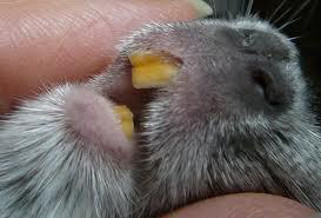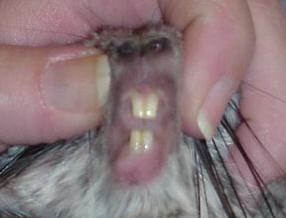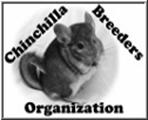Diet is also an important part of dental health. If chinchillas are fed a quality pellet that meets their nutritional needs the teeth will be healthy. Below are pictures of chinchilla teeth, the photo on the left shows the healthy orange color the teeth will have when their nutritional needs are met.
The photo on the right shows how the teeth lighten and turn white when the chinchilla is not receiving enough calcium. Chinchilla teeth should be checked regularly to ensure that they are the proper color. If the teeth are white, light yellow or striped, consult with a veterinarian as to the proper course of action to correct the deficiency. Even with proper nutrition, the chinchilla can experience dental issues. If the chinchilla is fed treats that are sticky or contain a lot of sugar, dental caries (cavities) can occur, causing tooth loss and other problems since the teeth will move within the mouth, attempting to fill in the gap.
 Healthy, orange chinchilla teeth
Healthy, orange chinchilla teeth White chinchilla teeth indicating
White chinchilla teeth indicatinga calcium deficiency.
There is another way diet can affect the teeth. While other mammals’ teeth are imbedded in the jaw bone, chinchilla teeth are attached with connective tissue. The teeth float freely in the socket, held in by the connective tissue and the surrounding teeth. If a chinchilla does not receive enough vitamin C from its diet, the connective tissue will loosen. This will cause the teeth to move within the gums causing them to point inward or outward and resulting in spurs or points. Abscessescan also develop when the teeth are loose. Keep in mind, a quality chinchilla pellet should contain enough of both vitamin C and calcium to help prevent any dental issues.
Signs of Possible Dental Issues
Watching a chinchilla eat is one of the best ways to determine if any dental problems exist. If the chinchilla constantly paws at the mouth, acts like it is choking, drools, has a loss of appetite, looses weight, or begins to eat but then drops the food, it could be experiencing mouth pain.
What to do if Signs of Dental Issues are Present
If the chinchilla exhibits any signs of dental problems, it is best to get the chinchilla to a veterinarian who is experienced in exotic animals and have a full dental workup performed. Since chinchilla mouths are so small and chinchillas are wiggly animals, it is necessary for the chinchilla to be anesthetized for the exam. Often, x-rays will also be taken to get a better idea of the nature of the problem. Some issues such as points, spurs, a trapped tongue and dental abscesses can be treated. Others, such as malocclusion, are a death sentence for the chinchilla. Fast action on the part of the owner is important in orderto get the best outcome and prevent any more suffering on the part of the animal.



 Site Last Updated on December 31, 1969 05:00 pm
Site Last Updated on December 31, 1969 05:00 pm